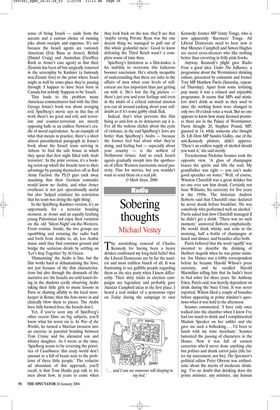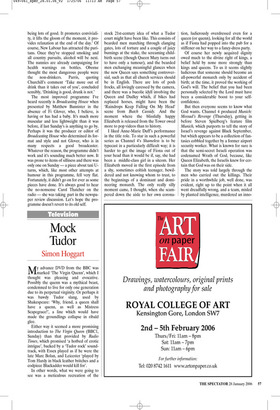Sobering thoughts
Michael Vestey
The astonishing removal of Charles Kennedy for having been a heavy drinker confirmed my long-held belief that the Liberal Democrats are by far the nastiest and most ruthless bunch of all. It was frustrating to see gullible people regarding them as the nice party when I knew differently. Their dirty tricks in election campaigns are legendary and probably gave Alastair Campbell ideas in the first place. I heard a real stinker of a poisonous viper on Today during the campaign to oust Kennedy: former MP Jenny Tonge, who is now apparently ‘Baroness’ Tonge. All Liberal Democrats need to hear now is that Menzies Campbell and Simon Hughes are secret cross-dressers who like nothing better than cavorting in frilly pink frocks.
Anyway, Kennedy’s plight gave Radio Four a good idea: Under The Influence, a programme about the Westminster drinking culture, presented by columnist and former Tory MP Matthew Parris (Saturday, repeated Thursday). Apart from some irritating pop music it was a relaxed and enjoyable programme. It seems that MPs and ministers don’t drink as much as they used to since the working hours were changed to only two 10 o’clock votes a week. But no one appears to know how many licensed premises there are in the Palace of Westminster; Parris thought 20, Stephen Pound, MP, guessed at 14, while someone else thought 26. Lib Dem MP Sandra Gidley, one of the anti-Kennedy plotters, didn’t approve. ‘There’s an endless supply of alcohol should you want it,’ she said sternly.
Trencherman Nicholas Soames took the opposite view. ‘A glass of champagne braces the spirits and lifts the soul. My grandfather was right — you can’t make good speeches on water.’ Well, of course, Winston Churchill was a great drinker but no one ever saw him drunk. Certainly not Jane Williams, his secretary for five years in the 1950s. The historian Andrew Roberts said that Churchill once declared he never drank before breakfast. ‘He was somebody who performed well on alcohol.’ Parris asked him how Churchill managed if he didn’t get a drink. ‘There was no such moment,’ answered Roberts emphatically. He would drink whisky and soda in the morning, half a bottle of champagne at lunch and dinner, and brandies after both.
Parris believed that the word ‘squiffy’ was invented to describe the drinking of Herbert Asquith when he was prime minister. Joe Haines was a lobby correspondent before he became Harold Wilson’s press secretary, and he recalled Harold Macmillan telling him that he hadn’t been to bed sober for three years. Sir Anthony Eden, Parris said, was heavily dependent on drink during the Suez Crisis. It was never reported. Wilson liked a couple of brandies before appearing at prime minister’s questions when it was held in the afternoon.
Soames commented, ‘I have only once walked into the chamber when I know I’ve had too much to drink and I complimented Madam Speaker on her ankles and she gave me such a bollocking ... I’d been to lunch with my wine merchant.’ Soames lamented the passing of characters in the House. Now it was full of earnest careerists who’d never done anything else but politics and drank carrot juice (the latter my assessment, not his). The Spectator’s political editor Peter Oborne was enthusiastic about the merits of moderate drinking: ‘I’ve no doubt that drinking does the prime minister, any minister, any human being lots of good. It promotes conviviality, it lifts the gloom of the moment, it provides relaxation at the end of the day.’ Of course, New Labour has attracted the puritans. Once they’ve stopped smoking and all country pursuits, alcohol will be next. The nannies are already campaigning for health warnings on bottles. Oborne thought the most dangerous people were the non-drinkers. Parris, quoting Churchill’s comment ‘Take more out of drink than it takes out of you’, concluded sensibly, ‘Drinking is good, drunk is not.’ The most improved programme I’ve heard recently is Broadcasting House when presented by Matthew Bannister in the absence of Fi Glover, who, I believe, is having or has had a baby. It’s much more muscular and less lightweight than it was before, if last Sunday’s is anything to go by. Perhaps it was the producer or editor of Broadcasting House who determined its format and style and not Glover, who is in many respects a good broadcaster. Whatever the reason, the programme didn’t work and it’s sounding much better now. It was prone to items of silliness and there was only one on Sunday — a piece about taxi Uturns, which, like most other attempts at humour in this programme, fell very flat. Fortunately, it didn’t go on for ever as some pieces have done. It’s always good to hear the no-nonsense Carol Thatcher on the radio — she was taking part in the newspaper review discussion. Let’s hope the programme doesn’t revert to its old self.























































 Previous page
Previous page